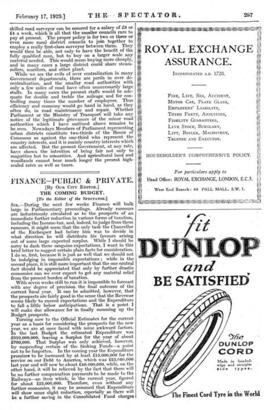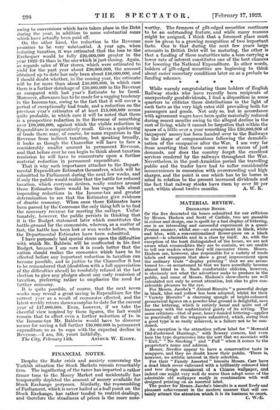FINANCE—PUBLIC & PRIVATE.
[By OUR CITY EDITOR.]
• THE COMING BUDGET. [To the Editor of the SPECTATOR.] SIR,—During the next few weeks Finance will bulk large in Parliamentary proceedings. Already rumours are industriously circulated as to the prospects of an immediate further reduction in various forms of taxation, including the Income-tax, and, indeed, to judge from these rumours, it might seem that the only task the Chancellor of the Exchequer had before him was to decide in what direction he will distribute his favours arising out of some large expected surplus. While I should be sorry to dash these sanguine expectations, I want in this brief letter to suggest certain plain facts for consideration. I do so, first, because it is just as well that we should not be indulging in impoisible expectations ; while in the second place, it is still more important that the one central fact should be appreciated that only by further drastic economies can we ever expect to get any material relief from the present burden of taxation. With seven weeks still to run it is impossible to forecast with any degree of precision the final outcome of the current fiscal year. It can be admitted, however, that the prospects are fairly good in the sense that the Revenue seems likely to exceed expectations and the Expenditure to fall a little below anticipations. That is a point I will make due allowance for in finally summing up the Budget prospects. Turning now to the Official Estimates for the current year as a basis for considering the prospects for the new year, we are at once faced with some awkward factors. In the last Budget the estimated Expenditure was £910,000,000, leaving a Surplus for the year of about £700,000. That Surplus was only achieved, however, by suspending certain of the Sinking Funds—a point not to be forgotten. In the coming year the Expenditure promises to be increased by at least £15,000,000 for the service on our Debt to America, which was £25,000,000 last year and will now be about £40,000,000, while, on the other hand, it will be relieved by the fact that there will be no further compensation payments to be made to the Railways—an item which, in the current year, figured for about £25,000,000. Therefore, even without any further economies, it may be assumed that Expenditure will show some slight reduction, especially as there will be a further saving in the Consolidated Fund charges owing to conversions which. have taken place in the Debt during the year, in addition to some substantial sums which have actually been paid off. On the other hand, the reduction in the Revenue promises to be very substantial. A year ago, when reducing taxation, it was estimated that the lost to the Exchequer would be fully £20,000,000 greater in the year 1923-24 than in the one which is just closing. Again, as regards sales of War stores, which were estimated to yield for the past year about £90,000,000, the amount obtained up to date-has only been about £40,000,000, and I should doubt whether, in the coming year, the estimate will be for more than about- £40,000,000, in which case there is a further shrinkage of £50,000,000 in the Revenue as compared with last year's Estimate to be faced. Moreover, allowance has to be made for a sagging tendency in the Income-tax, owing to the fact that it will cover a period of exceptionally bad trade, and a reduction on the previous year's estimates of at least £15,000,000 seems quite probable, in which case it will be noted that there is a prospective reduction in the Revenue of something over £80,000,000, against which the visible reduction in: Expenditure is comparatively small. Given a quickening of trade there may, of course, be some expansion in the Revenue from indirect taxation, but speaking broadly,, it looks as though the Chancellor will have to face a. considerably smaller amount in permanent Revenue,, and that before ever he can begin to think about taxation remission he will have to concentrate upon a further material reduction in permanent expenditure. That is why such importance attaches to the Depart- mental Expenditure Estimates themselves, which will be submitted to Parliament during the next few weeks, and if only the public would realize that the battle for reduced taxation, which everyone desires, really centres around those Estimates there would be less vague- talk about impending reductions in the Income-tax and greater determination to see that the Estimates give evidence. of drastic economy. When once those Estimates have been passed by the Commons the only thing left is to find the necessary revenue for meeting the outlays. Unfor- tunately, however, the public persists in thinking that it is the Budget statement later which constitutes the battle-ground for the economists, whereas, as a matter of fact, the battle has been lost or won weeks before, when. the Departmental Estimates have been submitted. I have purposely laid special stress upon the difficulties with which Mr. Baldwin will be confronted in his first Budget, because I am sure it is much better that the nation should realize the economies which have to be effected before any important reduction in taxation can become possible, and in justice to the Chancellor it has to be remembered that (doubtless with a full appreciation of the difficulties ahead) he resolutely refused at the last election to give any pledges about any, early remission of taxation, preferring rather to emphasize the need for further economy. It is quite possible, of course, that the next seven weeks may reveal a great saving in Expenditure for the current year as a result of economies effected, and the latest weekly return shows a surplus to date for the current year of £47,000,000. Even, however, if we take the cheerful view inspired by these figures, the fact would remain that to effect even a further reduction of ls. in the Income-tax Mr. Baldwin would have to discover means for saving a full further £50,000;000 in permanent expenditure so as to cope with the expected decline in Revenue.—I am, Sir, yours faithfully,











































 Previous page
Previous page